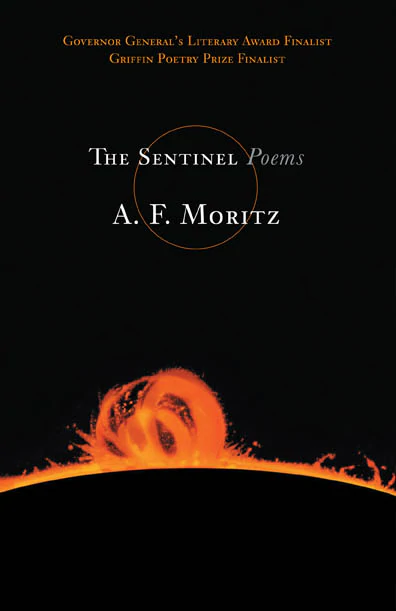
A. F. Moritz has written more than 15 books of poetry. He has been a finalist for the Governor General’s Literary Award and he has won the Award in Literature of the American Academy and Institute of Arts and Letters and a Guggenheim Fellowship. His recent collection, Night Street Repairs, published by House of Anansi Press in 2005, won the ReLit Award and The Sentinel was given Poetry magazine’s Bess Hokin Prize. A. F. Moritz lives in Toronto and teaches at Victoria University.

Judges’ Citation
A. F. Moritz has beautiful command of what William Empson called ‘a long delicate rhythm based on straight singing lines.’
Selected poems
by A. F. Moritz
Come, my body, leap up, while you still can,
onto my knees, into my lap. Come let me pet you,
comfort you and take comfort while there’s time,
while you last. How calm you are: content, it seems,
with your infirmity, your age, in the almost changeless
youth of your soft hide, your pelt and shy quiet,
expressionless as you huddle and crouch for this leap
you can still make, though it’s grown great, this petty
piece of your young and many springs.
Why did I never, body, cherish you enough?
Although I thought I was spending all my minted hours
on you, till I’d cry at the long waste of time, chained
by eyes and tongue, the ends of every extremity,
to your pleasure. Now I can’t recall ever once
kissing you, lying locked in you, deep as I want.
You’ll die, it won’t be long, body, swiftly
in animal nobility – how you wear your decline unnoticing,
the way a poor man walks in his only shirt to work –
and then, without you, in what mud of my own
making will I linger, falling apart? Purr now
and fuse your old pleasure into crotch of my torso,
palm of my hand, vision of eyes and sag of diaphragm
inseparably; they’re yours. Give me your indifference
that a once forest-wide range comes down
to couch and counter now, and this lap. Give me
your unrepentant having-known
a more-than-ant’s-intimacy with the grass,
a more-than-god’s-innocence in the hunt,
a greater-than-winged-agility in branches
and light. Leap up, body, while you still can,
let me finally hold you, feel you, close enough.
Copyright © 2008 A.F. Moritz
Old Pet
We found a jar there. Not a vase, not a piece of the potter’s art
but glass, from a store shelf, with a threaded mouth,
the lid and label long gone, all residue of the product blotted away:
bright crystal. I had to tell you this because the word jar
dwells in between comprehending both. It reminded us of songs we know,
the “broken water jar,” the “jar in Tennessee,” the “drinkin’ liquor
from an old fruit jar.” But the desolating place: white weeds,
white ground baked into sharp lumps and ridges,
a dead sapling, bushes crisp with thirst, rattling in a breeze.
No moisture in the jar. No way to tell if it had been thrown away
or washed or kept as a vessel. We succeeded for a while in seeing
the curves and sun-glints of its strange perfect hollow with affection.
We felt shaken, imprisoned, as though the low whine of the acres of flies,
as though the silence, were aftermath of a deafening shout. We longed
for wet darkness, even if it brought that doom-laden bird, the nightjar.
Copyright © 2008 A.F. Moritz
The Jar
Thou poem of lost attention and half try,
do you fear more the inner world or outer?
I do not love the self less than the others,
my name is legion and my mouth one cry.
Thou poem of the unwell, of the dry well and doom,
and the snake’s on your lip, in you the toad persists.
Did we come here just to read of what exists?
I champ at my winter bit to be in bloom.
But what’s the difference between you, poem, and the flower?
Don’t both break from the compost as long as it may be?
You are the one who knows what metaphor
and imposes it. Two dandelions are not similar to me.
Thou song of all-powerful individuality,
if only I could rest in you escaping me…
You would never again be troubled by the nudity
of the mother, or the Heart Fall’s killing roar
as you slid toward it, catafalqued on the fluid
descents of a new old world, shrouded in greenwood.
Thou ignorant epic of half-knowing ever more,
thanks in thought’s ruin for reminding me.
Copyright © 2008 by A. F. Moritz, The Sentinel, House of Anansi
Thou Poem
I really did love you in a sense, colleagues,
friends and fellow citizens and passersby
of my day here, who stormed the smoking world,
struggling to plant your flags or at least be heard.
I looked at you with consistent and unfeigned
interest, delighted in the revelation
of your pointless variety. It was joy to know
myself a poet among so many who knew
it also, but kept it quiet – the one thing
you did keep quiet. So many males and females
of divers pretentions: fortified handmade heights
from which in rage and fear you each would look
downward at me and melt in love. And I
would melt too and would feel the sympathy
of living with you among the flowers and rocks,
and dream sometimes for long seconds on end
that all any of you wanted was blessèd life
for everyone, and me too. But she and I
clung to each other, comrades, and I understood
that you more truly were the storm, and though
the two of us are dead now, what we had
to do in life, in fact, was to survive you.
Copyright © 2008 A.F. Moritz